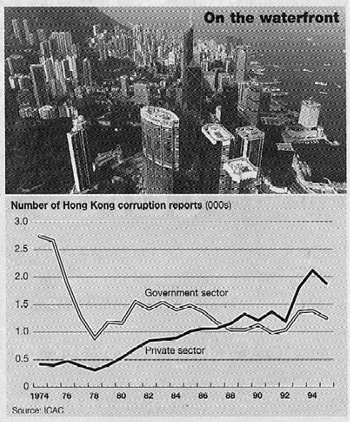Hong Kong holds line against corruption
But fraud fighters face tests after 1997 handover
Hong Kong holds line against corruption
But fraud fighters face tests after 1997 handover
By John Ridding

There are two lines on the chart traced by Mr Tony Kwok, head of operations at Hong Kong's Independent Commission Against Corruption (ICAC). One records reports of graft in the private sector, the other in public administration.
How these trends evolve through Hong Kong's return to China next year is one of the main concerns of the business community and the public. Recent surveys have pointed to fears that graft, like sovereignty, will cross the border after 1997.
Mr Kwok, who joined the commission in the 1970s when it was launched and took up his new post last month, is confident the problem will be held in check.
But the firm grip required to maintain clean government and fair competition in business will provide a test of the autonomy of the territory's institutions, the morale of the ICAC and the public's willingness to speak out against abuses. Mr Kwok's charts suggest the line is being held.
An alarming rise in corruption between 1992 and 1995 appears to have been halted partly through tough action bby the authorities. Intelligence teports back Mr Kwok's claim that the trends reveal a fall in corruption, rather than just in the number of complaints.
This view is also supported by independent observers. A report published last week by the Political and Economic Risk Consultancy said that "as yet, fears [of increased corruption] have not been realised". It placed the territory behind only Singapore and Japan in its rankings of Asia's cleanest business environments.
The sharp increase in corruption in 1993 and 1994 appears to have been related to the handover. "Political uncertainty, in this case amplified by the transfer of sovereignty, increases the temptation to make money while you can," says a criminologist at one Hong Kong university. Mr Kwok refers to it as the "quick buck syndrome" and says professionals such as lawyers and doctors have fallen to temptation too.
An additional consideration for Hong Kong's fraud squad has been the increase in cross-border trade. As trade has grown, so have opportunities for corruption at customs and immigration posts. Mr Kwok cites the example of car smuggling, including a case where five stolen Mercedes were found inside a single container.
In response, authorities on either side of the border have stepped up co-operation. Since exchanges started in 1988, the ICAC has conducted 60 visits to China to interview a total of 120 witnesses in corruption cases. There has been a similar flow in the opposite direction.
"Where we co-operate with the Chinese authorities we get the impression they are very serious," says Mr Kwok. Across the border in Guangdong Province, Mr Lu Riuhua, the new governor, has pledged to step up the crackdown.
Many in Hong Kong, however, worry about whether the crackdown on their side of the border can be sustained. "I don't see a rapid deterioration, but I do see corruption increaseing," says one sales manager. "There is the risk that the business culture will become more contact-driven and less transparent and this will create problems.
Others fear the ICAC will find it difficult to pursue cases involving Chinese officials after the handover and that its independent status could come under pressure. The Political and Economic Risk Consultancy argues that the biggest challenge will be in regulating mainland-owned companies operating in the territory.
It also warns of the corrupting effects that could result if China seeks to curb the pay of Hong Kong civil servants in an attempt to narrow the gap with their mainland counterparts.
Mr Kwok is not swayed by such fears. He notes that the ICAC's independence is upheld by the Basic Law, China's constitution for the Special Administrative Region, as Hong Kong will be known after the handover. Morale is high, he claims, with falling ICAC staff turnover, which declined to 5.7 per cent last year, below the civil service rate.
Public support for the ICAC remains strong, opinon polls show. To ensure the public continues to report graft and testify in court, the commission's extensive propaganda effort is being stepped up.
In addition to the existing TV commercials, the ICAC is leading community leafleting drives and plans a drama series on national television in the coming months, Mr Antonio Chu, assistant director of community relations, says the commission is even weighing an extension of its education effort to the kindergarten.
Such moves show how seriously the ICAC is viewing the handover. "We have a big role to play in a successful transition," says Mr Kwok. In time the lines on his charts will tell how well that role is played.

